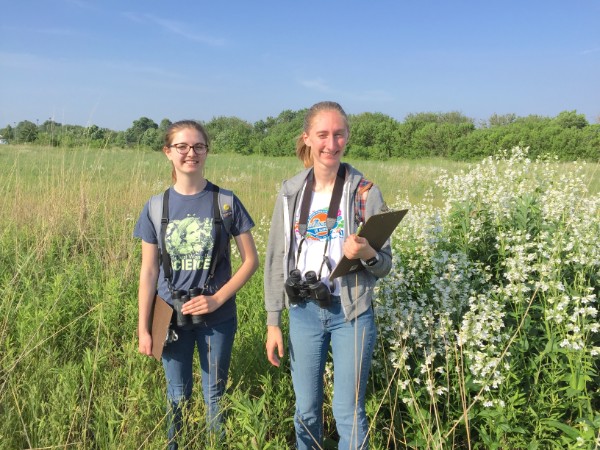Leah Bieniak Biology Research
Name: Leah Bieniak

Class: 2021
Major: Environmental Studies (Ecology)
Hometown: St. Charles, Illinois
Name of research project: Determining Species Abundance and Habitat Preferences of Breeding Bird in Bloomington-Normal, Illinois
Name of faculty research mentor: Given Harper
Name of research grant: Together, my research partner and I have received a grant from the Illinois Ornithological Society as well as The Ames Library Scholarly and Artistic Research Award. Individually, I received funding from the Robert S. and Nell B. Eckley Scholars and Artists Program, and my research partner Rachel received funding from the Criley Endowed Fund.
Research Summary: We are conducting a bird survey and habitat analysis of the urban areas of Bloomington-Normal. We want to determine what bird species are present in Bloomington-Normal during the breeding season and what habitat characteristics they prefer. Our ultimate goal is to make recommendations to the parks departments of both towns on ways to increase or improve the preferred habitat so as to better support bird populations. Dr. Harper developed the original idea for this research. Last year, Dr. Harper and other experienced birders documented several species in Bloomington-Normal during the breeding season that are typically not expected to breed in urban areas. The presence of these birds motivated us to determine what other species may be transitioning to urban areas as natural areas continue to diminish.
How has Illinois Wesleyan prepared you for conducting research?
I have taken many classes here at IWU that have given me experience with aspects of the scientific method. Many of the STEM courses available at IWU have a research or lab component, so there is ample opportunity for experiential or hands-on learning. I'm grateful to have taken two ecology-based courses that have allowed me to practice field research (Introduction to Ecology and Field Ornithology) because they gave me the foundation I needed to manage this research more successfully.
What do you hope to gain from this experience as you look forward to your future?
This experience has already been a wonderful educational opportunity, and I have learned a great deal about designing and implementing research methods, reviewing scientific literature, observing birds and communicating details about our research and results to others. I hope that this education continues, and that I can improve my scientific writing skills. Second, I hope that I will get to see our research have a tangible, positive impact on our community. The results of our research could help guide improvements to the natural and urban habitat in Bloomington-Normal, and it can act as the basis for future research. I would love to come back to Bloomington-Normal in the years after completing our research and see that breeding bird populations are indeed more successful.
What’s been your favorite part of conducting research so far?
My favorite part about conducting research so far has been learning to identify birds by sight and song and getting to know Bloomington-Normal better. I've always been a bird nerd, and it's great to finally have a better understanding of the species I love so much. Our bird surveys have taken us all around town, so I am also gaining a better understanding of the place I call home while I'm at school. I am extremely lucky to get to work with Dr. Harper and Rachel Schoenecker (Biology, '20). Dr. Harper is one of the best teachers I've ever had, and his guidance has been invaluable to Rachel and I during our research. Getting to work with someone with such a wealth of knowledge and experience is an amazing opportunity. I feel that I have learned a great deal from both Dr. Harper and Rachel, and I have certainly improved my collaboration and communication skills. I couldn't have gotten a better team!
In your opinion, why is it important for undergraduate students to participate in research opportunities?
Research opportunities for undergraduate students are important because it gives us a deeper understanding of our fields, allows us to contribute to our fields and gives us experience that we can apply to our future occupations. Even if an undergraduate chooses not to do research in the future, they will still have a unique set of skills and knowledge that can be applied to their work.